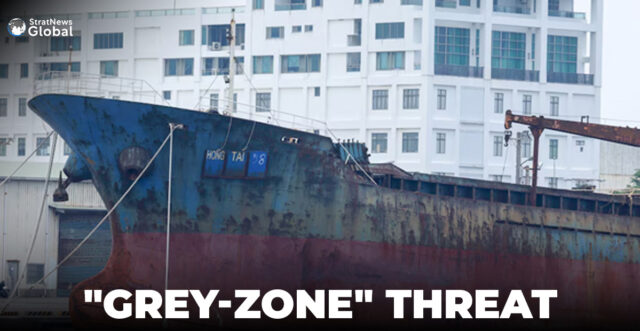Coast guard captain Juan Chung-ching steers his patrol vessel through the Taiwan Strait, monitoring for threats to undersea cables that Taipei warns are China’s latest grey-zone warfare target, crucial to the island’s communications.
Juan steered his 100-ton vessel, armed with water cannons and an autocannon, toward TP3, the undersea cable that made international headlines when a Chinese captain was found guilty of deliberately severing it this year.
TP3 is one of 24 undersea cables connecting Taiwan to the domestic or global internet.
Juan said such missions have become a top priority to combat China’s grey-zone warfare, a tactic meant to drain Taiwan’s resources while falling short of an act of war. On August 28, Reuters became the first media outlet to join one of these patrols.
“Their incursions have severely undermined the peace and stability of Taiwanese society,” said Juan, whose boat escorted the Chinese-crewed Hong Tai 58 for investigation hours after TP3 went offline in February.
“We are stepping up patrols in this area, monitoring for any vessels engaging in disruptive or destructive activities.”
Taiwanese authorities have connected two incidents of suspected underwater sabotage with China-linked boats this year, including one in Taiwan’s north.
China’s Taiwan Affairs Office did not respond to a request for comment. It has previously been said that Taiwan was “manipulating” possible Chinese involvement in the severing of undersea cables and making up accusations before the facts were clear.
Beijing views Taiwan as its own territory and claims the strategic waterway. Taipei rejects China’s territorial claims.
24-Hour Patrol
Taiwan’s stepped-up response comes with the Baltic Sea region on high alert after a string of suspected underwater sabotage incidents since Russia invaded Ukraine in 2022.
In the waters near TP3, coast guard vessels are now conducting 24-hour patrols.
An alert system detects vessels that come within a one-kilometre range off TP3 at slow speed, while dozens of operators at radar stations work to identify suspicious ships, the coast guard said.
Radio warnings are issued to those boats before coast guard vessels are dispatched to warn them away.
“Taiwan ranks among the top countries facing this issue,” Lin Fei-fan, Deputy Secretary-General of Taiwan’s National Security Council, told Reuters.
“We are indeed very close to China, and many densely populated submarine cable areas are highly vulnerable to damage.”
The task has stretched coast guard resources. Their eight boats and nearly 500 officers in the area are also responsible for life-saving missions and enforcing maritime law.
High on their watch list are 96 China-linked boats blacklisted by Taiwan. Many carry flags of convenience registered to third countries to avoid taxes and regulations.
Taiwan is also monitoring nearly 400 other China-linked boats, including cargo ships that could be converted into war vehicles, said a senior Taiwan security official briefed on the matter.
Taipei and other “like-minded” capitals are sharing intelligence on the real-time locations of these boats, the official said, requesting anonymity due to the sensitivity of the matter.
“Those ships are like cannon fodder, piles of scrap metal,” said Jenson Chien, commander of a coast guard flotilla near TP3, pointing to several dilapidated Chinese boats.
“They employ minimal resources to disrupt and sever our connections, sowing unrest throughout Taiwanese society.”
(With inputs from Reuters)





